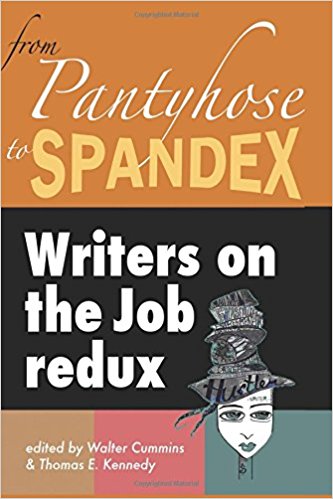This month, we celebrate the publication of From Pantyhose to Spandex: Writers on the Job Redux.
 The book is a veritable cornucopia of odd true tales about zany jobs that writers do to keep the ink flowing. And it happens to feature some of Broad Street‘s authors. The editors, Thomas E. Kennedy (“Prix Fixe,” from our “Hunt, Gather” issue) and Walter Cummins (from the forthcoming “Small Things, Partial Cures”), have cast a wide net that takes literary laborers from Tiffany’s famous jewelry store (that would be Julie Anderson, whose essay on China featured in our “Maps & Legends” issue) to the wheel of a taxicab in Copenhagen, Denmark; a Walmart boot camp; various stints as pantyhose-wearing office workers (Susann Cokal of our editorial staff); brokering canned goods to grocery stores; and into the Spandex of a superhero costume. The book grew out of Kennedy and Cummins’s curated feature, “Writers on the Job,” found on webdelsol.com.
The book is a veritable cornucopia of odd true tales about zany jobs that writers do to keep the ink flowing. And it happens to feature some of Broad Street‘s authors. The editors, Thomas E. Kennedy (“Prix Fixe,” from our “Hunt, Gather” issue) and Walter Cummins (from the forthcoming “Small Things, Partial Cures”), have cast a wide net that takes literary laborers from Tiffany’s famous jewelry store (that would be Julie Anderson, whose essay on China featured in our “Maps & Legends” issue) to the wheel of a taxicab in Copenhagen, Denmark; a Walmart boot camp; various stints as pantyhose-wearing office workers (Susann Cokal of our editorial staff); brokering canned goods to grocery stores; and into the Spandex of a superhero costume. The book grew out of Kennedy and Cummins’s curated feature, “Writers on the Job,” found on webdelsol.com.
Peruse the list of essays below and consider what sort of crazy jobs your personal Muses have demanded …
CONTENTS
Introduction
“My Life in Pantyhose,” Susann Cokal
“Testimony of a Copenhagen Taxidriver: An Essay in Four Movements,” Per Smidl
“Trading Secrets at the Melancholy House,” Jayne Thompson
“Experience,” Renée Ashley
“Moonlighting,” Walter Cummins
“A Midwestern Purgatory,” Heather Lang
“A Writing Junkie’s Tale,” Bill Mesce, Jr.
“Easter Eggs,” Kelly Jean Fitzsimmons
“Straight Job,” Peter Selgin
“Internship at Tiffany’s,” Julie Anderson
“On the Beach, Working, Waiting,” Kevin Carey
“With Any Luck,” Letisia Cruz
“The Head Clown,” Sean Toner
“Beyond Words, World & Pampers,” Roisin McLean
“Handling Another Man’s Woman,” Thomas E. Kennedy
“Give Me a W!” Robin Parks
“James and the Purple Dungeon,” Katie Singer
“My Life in Spandex,” Mike Aloisi
A note from the Editors:
The authors of From Pantyhose to Spandex: Writers on the Job Redux
take you on a tour through a single night in a taxi in Copenhagen
while listening to Mahler’s Ninth, through the “Melancholy House” of
a maximum security prison and assigning juvenile delinquents as their
sentence to do the sentences of an essay, through a woman’s decision to
sell her eggs for five thousand dollars, through why the legendary jewelry
store is called “Tiffany” rather than “Tiffany’s” (although the author
of the essay sticks to the titular possessive—as Truman Capote and Audrey
Hepburn did), and on through working picking forty-eight thousand
pounds of lobster on the beach, moonlighting (a teacher’s necessity),
the sleepless night of a veterinary assistant, working as a babysitter/
envelope stuffer/car-hop/Christmas ball saleswoman/gas-pump attendant/
and so much more (as one of our poets did in her hilarious essay,
“Experience”), a day job as a bookseller, a translator, and all—or most
of—the ways in which writers put food on their tables.
If they don’t get paid, writers will write for free. Writing is an addiction,
as the author of one essay notes. We will discomfit, distress,
even degrade ourselves if only we can keep soul and body together to go
on writing—to the discovery of what makes us tick.
As Dostoyevski wrote at the start of his writing life, “I involve myself
with this mystery because I want to be a human being.”








